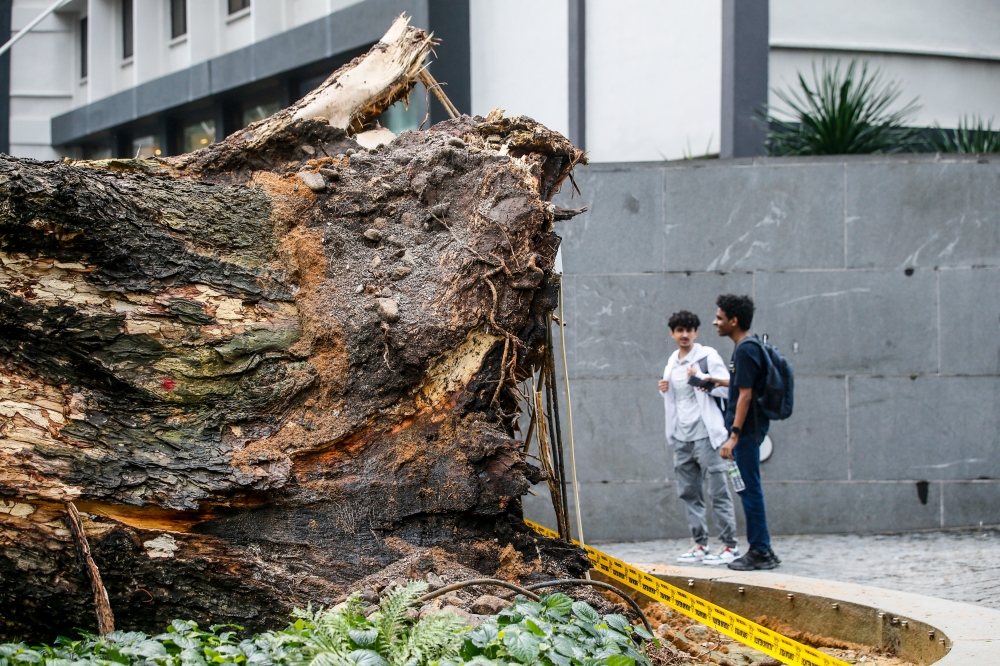MAY 20 — My university is situated in Cheras, on top of a hill. Many cars park along the slopes near which are many trees.
The other day I (once again) reminded students that unless they have absolutely no choice — in light of the recent incidents in KL involving falling trees (not least the ones which fell on both Jalan Sultan Ismail and Jalan Pinang a week ago) — do NOT park along those slopes.
You just never know when a tree may fall, especially during the huge storms we have been experiencing lately.
I would go so far as to caution any driver from parking their car under any tree these days.
I have lost count of the number of cars I have seen crushed by falling branches.
In addition, I would also caution people to stay clear of outdoor parking lots especially those with a tendency to flood. Unless you’re just stopping for a few minutes, it’s probably safer to find parking indoors.
Anthropologist Jared Diamond calls this way of thinking “constructive paranoia”.
On one of his many trips to New Guinea, he noticed that his native guides refused to sleep under a tree if it was dead. At first Diamond felt that their behaviour verged on overreaction but then it occurred to him that a) every day he could hear trees falling somewhere in the forest and b) given how often the New Guineans slept under trees, it was entirely rational to avoid sleeping under a dead tree because one never knows when it would fall (see note 1).
Risk expert Nassim Taleb latched on to Diamond’s concept and explained that we must never discount any kind of behaviour — no matter how “irrational” or “superstitious” they appear — if such behaviour facilitated long-term endurance (or survival).

Ergo, a little bit of “paranoia” ensures we don’t suffer needlessly.
For Taleb, Diamond and the New Guineans, irrationality means one lives to see another day. Period.
It doesn’t matter how smart or rich or connected you are. If you ruin yourself — i.e. if you get into a high-impact irreversible shit-storm as a result of actions you could’ve avoided — it’s probably because you took actions you believed were rational but were really the opposite.
Consider these examples:
- • The overweight dude who chomps down nasi lemak and fried chicken by the bucket because he thinks his heart is stronger than 99 per cent of other people.
- • The corporate director who works 12 hours a day because as long as he’s making truck-loads of money, what possible impact could there be to his health and family?
- • The victim of every Ponzi scheme who didn’t question their far-above-average monthly returns from that amazing fund they’re so enchanted with
- • Parents who pressure their kids non-stop 24/7 to get 10As or die trying, brushing aside every news report of teenage depression and suicide
- • Wannabe NASCAR drivers flying at 180km/hour from Penang to KL who believe car crashes only happen in newspapers
For the folks above, it’s a tragedy that only reality will persuade them of the folly of their actions. Would it really hurt to have behaved in a constructively “paranoic” manner?
Imagine taking precautions in what I eat and exercising regularly because I believe there’s a huge likelihood I may die prematurely otherwise. Or being “scared” about losing my relationships as a result of over-working and thus making serious efforts to come home early, to invest in my family, etc. Or being super-cautious when I drive because I know one wrong move can wreck the entire car and everyone inside.
Or not parking near a huge tree because you just never know when it may fall and destroy your windshield.
It’s not about being afraid of life; it’s about removing unnecessary risks thereby lowering the chances of reaping big-time irreversible consequences.
Note 1: Check out the entire chapter 7 of Diamond’s The World Until Yesterday: What Can We Learn From Traditional Societies?
*This is the personal opinion of the columnist.






















